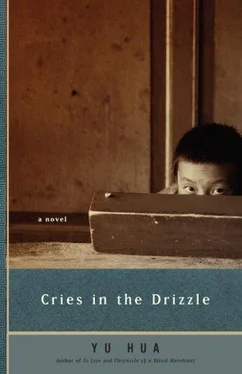Lin Wen did not stand right next to the window, for he was perfectly able to imagine how Su Hang would throw himself on the old woman. He concentrated instead on his mission as sentinel, taking a few steps back to assure a fuller view of any villager's approach.
He heard the sound of a body hitting the ground, followed by some shocked groans. At first the old lady must not have known what was happening. Once she did realize, Lin Wen heard a hoarse voice saying heatedly, “You bastard, I am old enough to be your grannie!”
This comment made Lin Wen chuckle. He knew that Su Hang was already halfway there. Then he heard her cry, almost penitently, “What a disgrace!”
She was not strong enough to withstand Su Hang's assault, and in her frail condition righteous anger could give way only to self-pity. Just at this moment — too soon for Su Hang — Lin Wen saw a man heading in their direction. Naked to the waist, sickle in hand, this apparition scared the daylights out of Lin Wen, and he rushed to the window only to see Su Hang kneeling on the floor, desperately tugging at the old woman's trousers, while she rubbed her shoulder (sprained, perhaps) and muttered something incomprehensible. At Lin Wen's warning, Su Hang rushed over and dived out the window with the furious energy of a rabid dog. Then they both raced madly toward the river. Su Hang kept throwing glances behind him, each time seeing a man with a sickle bearing down upon him. As Lin Wen fled for his life, time and again he heard Su Hang's despairing cry, “Can't! Not going to make it!”
As they dashed along the road toward town, through the midday heat, they threw up clouds of dust and their lungs protested furiously. Nauseated and caked in mud, they finally returned to safe territory.
Of my high school teachers, the music instructor, with his cultivated manners, made the deepest impression on me. He was the only teacher who spoke to the class in standard Chinese, and when he sat down in front of the organ to teach us a song I was captivated by his voice and demeanor. For a long time I would gaze at him in delight, and he became my ideal adult. What is more, he was the least snobbish of teachers, favoring all his pupils with the same smile. I still remember the first time he taught us. A songbook under his arm, dressed in a white shirt and dark blue trousers, he came into the classroom and told us solemnly, in the precise tone of a radio announcer: “Music begins where language disappears.”
My classmates, accustomed to hearing uncouth provincial teachers talking in local dialect, found this hilarious.
In the spring of my third year in high school, around the time that the color photograph was attracting so much attention, Su Hang, already regarded as a major headache by the school staff, used his crudity to make the music class an occasion for ridiculing the music teacher. He took off his gym shoes and laid them on the windowsill, then stuck both feet up on his desk. The foul smell issuing from his nylon socks permeated the entire room. In the face of this rudeness, our music teacher continued to sing lustily, his resonant voice creating a counterpoint to Su Hang's stench, exposing us to a collision between beauty and squalor. Only when the song was over did the music teacher push back from the organ, rise to his feet and say to Su Hang, “Put your shoes on, please.”
But this admonition succeeded only in reducing Su Hang to a paroxysm of mirth. Rolling about in his chair, he twisted around to us and said, “Can you believe it? He saidpleasel”
The music teacher, as courteous as ever, said, “None of that nonsense, please.”
This time Su Hang laughed even more wildly. Coughing ostentatiously, he patted his chest and said, “There he goes again with thatplease of his! This is cracking me up. Isn't he a riot?”
The music teacher was livid. Striding over to Su Hang s desk, he picked up his shoes from the windowsill and tossed them out the window. But as he turned around, Su Hang zipped over to the organ in his stocking feet, grabbed the songbook, and chucked it out of the window too. The music teacher was so stunned that he could only watch dumbly as Su Hang clambered out the window and then climbed back in again, shoes in hand. He returned the shoes to their perch on the windowsill, rested both feet on his desk, and gazed coolly at the music teacher, braced for action.
In the face of Su Hangs boorish behavior, the music teacher, so much admired by me, was utterly defenseless. He stood by the dais, his head slightly raised, and for a long time he said nothing at all. His face wore such a desolate look, you might have thought he had just received word of a death in the family, and it was ages before he finally said, “Could somebody go and fetch the song-book?”
After class, when many other boys crowded around Su Hang to hail his triumph, I did not join them. Somehow I felt a sense of loss, having just witnessed my role model being so easily humiliated.
It was not long after this that Su Hang and I went our separate ways. In actual fact, only I was aware of the rupture in our relations. All along he had regarded me as completely dispensable, and when I no longer joined the crowd clustered around him in the middle of the playground I alone was conscious of this change. Su Hang seemed unaware that I was now absent from his throng of adherents. He was in as high spirits as ever, whereas I now found myself alone. But I realized with surprise that the feelings I had experienced when I stood next to Su Hang were identical to my current sense of isolation. The only reason I had attached myself to Su Hang was to put on a show and try to look cool. Later, when I mentally reproached my brother Sun Guang-ping for sucking up to classmates from town, I sometimes would reflect ruefully that I had done much the same thing myself.
Now that I think about it, I am actually rather grateful for the beating that Su Hang administered that afternoon with the willow branch. But how shocked I was at the time — I had no idea that Su Hang would suddenly grab a branch and lay into me. A bunch of girls happened to be walking nearby, among them three whom Su Hang had fancied in the past. I could understand Su Hang's motive but I found it difficult to accept the way he chose to show off. At first I thought he was joking: he flogged me the way a carter might flog a recalcitrant mule, and I forced a smile and tried to get out of his way. But he persisted, and lashed me so fiercely across the face that my cheeks were stinging. When I saw that the girls had stopped and were looking on in wonder, my heart burned with shame. Intoxicated by his power, Su Hang kept turning his head and whistling at them, at the same time shouting at me to lie down. I knewwhy he wanted to hit me, but I neither lay on the ground nor seized hold of the willow branch, and instead headed off in the direction of the classroom. My classmates stood cheering as Su Hang pursued me and landed further blows on my back. I made no effort to resist but just kept on going. That afternoon my eyes blurred with tears of chagrin.
But in fact this humiliation made it possible for me to establish relations with Su Yu several months later. No longer did I claim to have lots of friends; I returned instead to solitude and began an independent life as the true me. Sometimes I found the experience so lonely that it was hard to overcome the emptiness inside, but I thought it better to maintain my self-respect than to gain superficial friends at the expense of shame. It was then I began to notice Su Yu, whose solitary manner as he walked down the side of the street made me sense a bond between us. Though still a teenager, Su Yu already projected an adult air of having lots of things on his mind, for he had yet to dispel the specter of his father's liaison with the widow back in Southgate. As I furtively took note of Su Yu, he likewise was quietly paying attention to me. I found out later that my utter indifference to my classmates had engaged his sympathy.
Читать дальше












